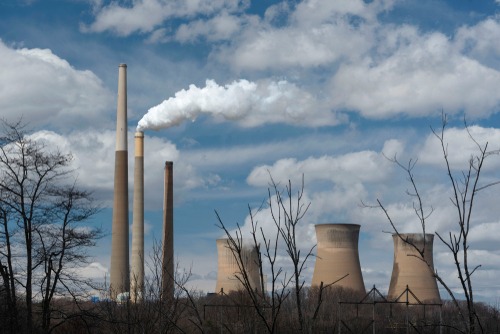
The controversial plan to march Pennsylvania into the Regional Greenhouse Gas Initiative (RGGI) was narrowly approved by a state commission Wednesday but will likely face a concerted counterattack from opponents who fear a devastating blow to the state’s energy industry.
The Pennsylvania Independent Regulatory Review Commission (IRRC) voted 3-2 in favor of Gov. Tom Wolf’s highly controversial plan to create a cap-and-trade program for carbon dioxide (CO2) emissions that will get Pennsylvania into the 11-state RGGI as early as next year. The RGGI currently includes 11 eastern and mid-Atlantic states that have banded together to launch individual cap-and-trade programs aimed at cutting CO2 emissions by 30 percent.
“Participating in RGGI is one more way for Pennsylvania, which is a major electricity producer, to reduce carbon emissions and achieve our climate goals,” Wolf said in a written statement after the vote. “In addition to the environmental benefits, participating in this cap-and-trade initiative will allow Pennsylvania to make targeted investments that will support workers and communities affected by the energy transition.”
The General Assembly and the business community, however, are not expected to go along quietly and allow Pennsylvania to become the first state to join RGGI without the approval of its state legislature. The RGGI plan will likely face further challenges in court and in the Republican-controlled legislature, which will next review the new regulations.
“Today commences the General Assembly’s role in the regulatory process,” said a statement from the Power PA Jobs Alliance. “We encourage and support House and Senate enactment of a concurrent resolution that will terminate the RGGI regulation…and, if necessary, override a potential gubernatorial veto.”
A CO2 cap-and-trade regime in Pennsylvania, critics say, would raise electricity costs and deliver a potentially fatal blow to coal mines and fossil-fuel power plants.
“Pennsylvania will inevitably move from its status as the number one energy exporter in the country to an energy importer from neighboring states like Ohio and West Virginia…states that emit the very same carbons RGGI says it will reduce,” said state Rep. Jim Struzzi (R-Indiana).
Lawmakers representing districts that are home to power plants and other industries in the line of fire have been fighting a stubborn battle against Wolf’s move, which came in the form of an executive order issued in 2019 that sidestepped the legislature.
“This broad policy discussion must remain with the legislature,” state Sen. Joe Pittman (R-21) said at the IRRC hearing, which was held in Harrisburg while the remnants of Hurricane Ida brought torrential rains and flooding to the area.
Pittman and other RGGI opponents reiterated their arguments that Wolf was moving too quickly and without enough regard to the power plants and industries that have been making great strides on their own in reducing CO2 and other greenhouse gasses and deserved an opportunity to make further improvements.
“They have adapted, and I believe they will have the opportunity to adapt, but they can’t do that if they are in Chapter 7 bankruptcy,” said Pittman, who urged Wolf to come back to the table and truly engage.
In testimony to the IRRC, the Pennsylvania Manufacturers’ Association noted that for many manufacturers, energy costs are the largest cost output month-to-month. The Department of Environmental Protection’s own modeling has estimated that, “if Pennsylvania joins RGGI, Pennsylvania electric consumers – residential, commercial and industrial – will be forced to pay $2.6 billion more for electricity over 9 years. Adding on additional costs will drive manufacturers out of Pennsylvania and make it exceedingly difficult to bring new firms in; essentially making RGGI a hard-cap on economic growth in the manufacturing sector.”
Some of the IRRC commissioners expressed concern that joining RGGI would indeed disrupt the current energy economy and urged the state to take steps to soften the blow as much as possible for displaced workers and struggling businesses.
“To participate in RGGI is to ignore the positive environmental impacts that are taking place right here in PA, which include a dramatic reduction in carbon emissions over the past two decades!” Sen. Gene Yaw (R-23) tweeted after the vote. “Moreover, PA will lose thousands of skilled & good paying jobs, as well as untold millions of dollars in its tax base for CO2 emissions reductions stated to be less than 1 PERCENT.”
Backers of RGGI, however, said the threat of climate change was too imminent and required immediate action rather than throwing it to the General Assembly for open-ended discussions that would likely not produce a workable plan.
A large part of Wednesday’s discussions during the lengthy IRRC session focused on the questions that will likely be the crux of any legislative or legal challenges: that the cap-and-trade program amounts to a tax rather than a fee, and that Wolf and the Department of Environmental Protection (DEP) failed to engage either the General Assembly or the public before forging ahead.
A delegation from the DEP told the commissioners while the power to tax does lie with the legislature, the DEP has had the authority to regulate air pollution from various sources since the 1960s, including the recent launch of a cap-and-trade program for nitrogen oxide that went forward without legislative approval or objections. The DEP representatives, including Secretary Patrick McDonnell, also noted that they had accepted input from lawmakers on the RGGI plan throughout the process.
The Pennsylvania Attorney General has 30 days to review the legality of the IRRC’s regulations.